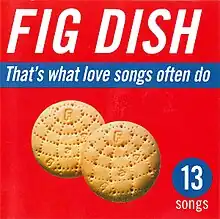That's What Love Songs Often Do
That's What Love Songs Often Do is an album by the American alternative rock band Fig Dish, released in 1995.[1][2] "Seeds" was the first single released from the album.[3] That's What Love Songs Often Do was a commercial disappointment.[4]
| That's What Love Songs Often Do | ||||
|---|---|---|---|---|
 | ||||
| Studio album by | ||||
| Released | 1995 | |||
| Genre | Alternative rock | |||
| Label | Atlas Records | |||
| Producer | Lou Giordano | |||
| Fig Dish chronology | ||||
| ||||
Production
The band recorded the album in three weeks, immediately after being signed by Polydor Records.[1] It was produced by Lou Giordano.[5]
Critical reception
| Review scores | |
|---|---|
| Source | Rating |
| AllMusic | |
| Chicago Tribune | |
| Daily Herald | |
| The Encyclopedia of Popular Music | |
| Houston Press | |
| MusicHound Rock: The Essential Album Guide | |
The Morning Call called the album "an exemplary collection of modern-day Chicago rock," writing that "the strong guitar melodies of Blake Smith and Rick Ness complement their equally intricate vocal melodies, and the tongue-in-cheek approach taken to hint at the horrid keeps the recording fun, never tedious."[11] Trouser Press wrote: "Able to conjure up a potent haze of slacker sloth and then obliterate it with a fierce rock assault (see 'It’s Your Ceiling' for a concise demonstration), Fig Dish keeps attitude out of the effort, concentrating on simply effective tunes."[5]
CMJ New Music Monthly deemed it "a respectably tight-fisted punch of buzzing guitar caterwaul."[12] The Chicago Tribune called it "a minor revelation," and praised the "sturdy melodies, concisely and smartly arranged."[7] The Washington Post judged That's What Love Songs Often Do to be "lively pop-grunge with more than a touch of Nirvana's swirling feedback and woozy despair."[13]
AllMusic wrote that the album delivers "solid alternative pop with a big guitar sound."[6] In a retrospective feature, the Riverfront Times called "Bury Me" "a sub-three-minute nerd-rock waltz with interesting arrangements (i.e., a bridge that slows down dramatically, before speeding up again in a drumming fury) and the plaintive (and effective) call, 'Wanna be with you!'"[14]
Track listing
| No. | Title | Length |
|---|---|---|
| 1. | "Bury Me" | |
| 2. | "Weak and Mean" | |
| 3. | "Seeds" | |
| 4. | "Chew Toy" | |
| 5. | "Nimble" | |
| 6. | "Wrong Nothing" | |
| 7. | "Quiet Storm King" | |
| 8. | "Going Gone" | |
| 9. | "Lemonader" | |
| 10. | "Rollover, Please" | |
| 11. | "It's Your Ceiling" | |
| 12. | "Resistance is Futile" | |
| 13. | "First History" |
References
- "Fig Dish | Biography & History". AllMusic.
- "The Rise, Fall, and Re-Release of Fig Dish". Chicago Magazine.
- Thompson, Stephen (October 26, 1995). "POP, KITSCH, PUNK: ALL HERE". Wisconsin State Journal. Rhythm. p. 8.
- Larkin, Colin (2006). The Encyclopedia of Popular Music. Vol. 3. MUZE. p. 448.
- "Fig Dish". Trouser Press. Retrieved 20 August 2021.
- "That's What Love Songs Often Do - Fig Dish | Songs, Reviews, Credits | AllMusic" – via www.allmusic.com.
- Kot, Greg (28 July 1995). "LOCALLY GROWN: WEIGHING A BUMPER CROP OF FRESH-CUT ALBUMS". Chicago Tribune. Friday.
- Nichols, M. David (August 18, 1995). "Fig Dish 'That's What Love Songs Often Do'". Daily Herald. Time Out. p. 7.
- Rowland, Hobart (August 31, 1995). "Sound Check". Houston Press. Music.
- MusicHound Rock: The Essential Album Guide. Visible Ink Press. 1999. p. 422.
- "FIG DISH SERVES UP PLATE OF POP HOOKS". The Morning Call. Retrieved 20 August 2021.
- Botchick, Cheryl (Sep 1995). "Reviews". CMJ New Music Monthly (25): 34.
- Jenkins, Mark (29 September 1995). "Agreeable Cleo, Pop-Grunge Dish". The Washington Post. p. N15.
- Zaleski, Annie. "Second Spin: Fig Dish, That's What Love Songs Often Do". Riverfront Times.